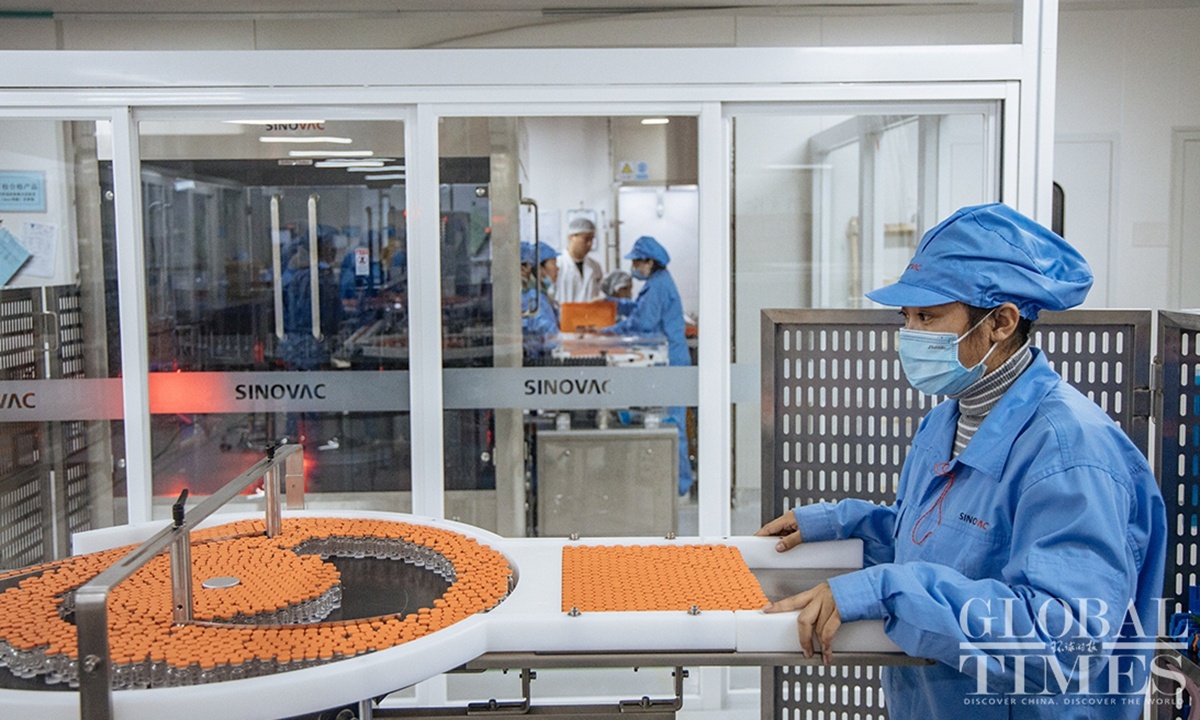
Sinovac photo: Li Hao/GT
The inactivated SARS-CoV-2 vaccine developed by China’s Sinovac was well tolerated and induced humoral responses in adults aged 60 years and older, the newly released results from the Phase I and Phase II clinical trials showed, which experts said will support China in expanding the use of the COVID-19 vaccine in elderly groups.
The Phase I and Phase II clinical trial findings of the Sinovac vaccine were released in Lancet medical journal on Wednesday. Sinovac claimed it was the first report of an inactivated SARS-CoV-2 vaccine tested in older adults aged 60 years old and above.
Vaccine efficacy is usually reduced in older adults due to immune senescence, but findings showed Sinovac’s vaccine is well tolerated and immunogenic in healthy adults aged 60 years and older, and neutralizing antibody responses to live novel coronavirus are not reduced in this population.
Experts believe this data will support China in its push for vaccination among elderly people.
On Wednesday, Sinovac’s application for the conditional market launch of its inactivated COVID-19 vaccine CovonaVac was accepted by China’s drug regulator, which is seen as a major step forward in making Chinese vaccines available for public use.
Sinovac’s vaccine was approved for urgent use in China in July 2020 and has been administered for key groups.
Feng Duojia, president of the China Vaccine Industry Association, told the Global Times on Thursday that Phase III data and approval from drug authorities are needed for elderly people to be vaccinated.
Sinopharm is likely to announce Phase III data earlier than Sinovac, as the former has already been granted conditional market approval.
Feng said that those two pharmaceutical companies are likely to announce their Phase III data on elderly and child groups around Chinese New Year.
An immunologist in Beijing told the Global Times on condition of anonymity that judging from vaccinations in other countries, elderly groups are more vulnerable to safety problems.
As the pandemic in China was quickly quelled, Chinese vaccine producers did not include many elderly people in their trials, so more caution is required.
However, it is a sign that China is pushing forward vaccination of elderly groups, the immunologist said.
According to the Lancet report, Sinovac did a randomized, double-blind, placebo-controlled, phase 1/2 clinical trial of CoronaVac in healthy adults aged 60 years and older in Renqiu, North China’s Hebei Province.
A total of 72 participants with an average age of 65.8 were enrolled in the Phase I clinical trial. Each intervention group and placebo group had 24 participants.
In the Phase II clinical trial, it recruited 350 participants with average age of 66.6. Each intervention group had 100 participants and the placebo group had 50.
All adverse reactions were mild or of moderate severity. The most frequently reported reactions were injection site pain, which occurred among 39 participants, and fever, which occurred among 14 people.
Most of the adverse reactions occurred within seven days of vaccination and participants recovered within 48 hours.
As of Aug 28, 2020, eight serious adverse events, considered unrelated to vaccination, have been reported by seven participants, or 2 percent of the total. All serious adverse events were considered to be unrelated to either the vaccine or the placebo.
The six-month follow-up analysis will continue. As of January 20, no vaccine-related serious adverse events have been reported.


